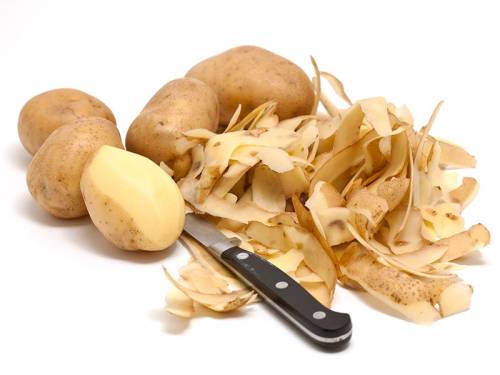Slowing down and savoring God’s gifts
October 21, 2019
 My grandmother was a farm wife during the Dust Bowl of the Great Depression. For the rest of her life, she was meticulous about not wasting food. She wouldn’t use a vegetable peeler on potatoes or carrots because she could remove less peel using a knife.
My grandmother was a farm wife during the Dust Bowl of the Great Depression. For the rest of her life, she was meticulous about not wasting food. She wouldn’t use a vegetable peeler on potatoes or carrots because she could remove less peel using a knife.
One of the first kitchen tools my mother taught me to use was a rubber scraper — a spatula with a long handle and a rubber scraping end. She learned from her mother how to get every morsel of food out of a bowl, pan or jar. I have seven rubber scrapers in a large jar beside my stove, so I can use the right one for each food container. I save and reuse even small amounts of leftovers, and I study the fridge frequently to make sure we’re eating everything before it goes bad. I am so grateful that in Seattle, where I live, there’s citywide composting. The food I do need to throw away is transformed into rich compost with little effort on my part.
My meticulousness about food waste, inherited from my mother and grandmother, is quite trendy these days. Christians can see the challenge of food waste in the bigger picture of food as a gift from God and mealtimes as a way for people to gather.
A 2018 USDA study showed that each American wastes an average of a pound of food a day. Dana Gunders, a food waste expert for the Natural Resources Defense Council, recently authored the report “Wasted: How America Is Losing Up to 40 Percent of Its Food from Farm to Fork to Landfill.” The statistics are painful to read: “Getting food from the farm to our fork eats up 10 percent of the total U.S. energy budget, uses 50 percent of U.S. land, and swallows 80 percent of all fresh-water consumed in the United States.” In the process, a residue of pesticides and other chemicals is left in the soil. And then we waste so much of the food produced. In effect, we are choosing to load 40 percent of it on a truck and use fossil fuel to drive it to a landfill, where the decomposing food creates methane and further pollutes our precious earth.
Food is a significant theme in the Bible from beginning to end. Adam and Eve are invited to eat the fruit of all the trees in the garden except one, and heaven is portrayed as a banquet. Jesus ate with the outcasts of his society, and after the resurrection, he fixed fish for his disciples on a beach.
Psalm 104 presents a vivid picture of God’s presence in the food chain. God is active in every aspect of the food we eat: soil, seeds, sun, rain, the growth of fruit trees and other plants, and the birth and life of animals. God cares about the plants and the animals, as well as the people who plant, grow, harvest, ship and sell our food. Understanding God’s care for our food production process can motivate us to tread lightly as we consume food — conserving, composting and sharing generously.
One of the huge tragedies of food waste is that the earth produces enough food for everyone, yet some are hungry. Some of us, of course, are the opposite of hungry, and the waste that takes place often goes unnoticed. For example, I was raised to clean up my plate, and I can’t seem to stop doing that. Yet I struggle to maintain a healthy weight. Am I sometimes wasting food by having put too much on my plate and eating it even when I am not hungry?
And do we sometimes waste food by eating on the run? Many of us eat too quickly to savor each bite, to enjoy the complexity of flavor designed by our Creator and nurtured by farmworkers. We eat alone, when Jesus enjoyed table fellowship.
For Christians, all the talk about food waste is really a call to slow down and consider how to treat food as a precious gift from God — to be stewarded wisely, received gratefully, enjoyed in the company of others and shared with the hungry.
Rev. Dr. Lynne M. Baab, author of numerous books, including “Sabbath Keeping” and “Nurturing Hope: Christian Pastoral Care in the Twenty-First Century”
Daily Readings
Morning Psalms 57; 145
First Reading Jeremiah 44:1-14
Or alternate First Reading Jeremiah 29:1, 4-14
Second Reading 1 Corinthians 15:30-41
Gospel Reading Matthew 11:16-24
Evening Psalms 85; 47
Today’s Focus: Christians and Food Waste
Let us join in prayer for:
PC(USA) Agencies’ Staff
Rhashell Hunter, Presbyterian Mission Agency
Sherri Hunter, Office of the General Assembly
Let us pray:
God of creation, for the sun, soil and rain from which we draw life, we thank you. For all who work to plant and harvest, we ask your blessing. We lift up all who are hungry and pray that you give us all a hunger for your justice. Amen.